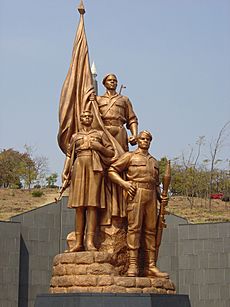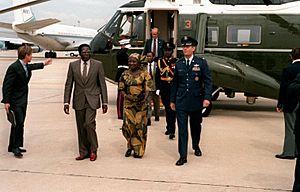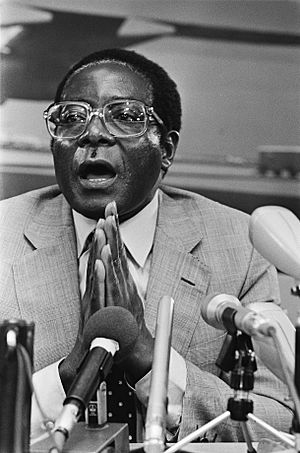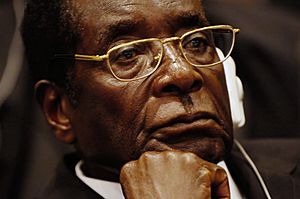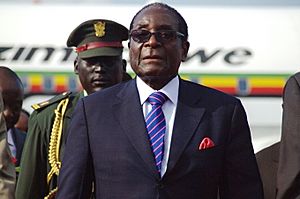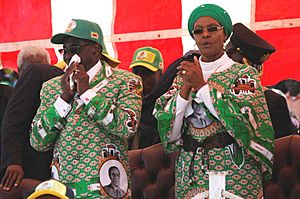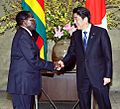Robert Mugabe facts for kids
Quick facts for kids
Robert Mugabe
|
|
|---|---|
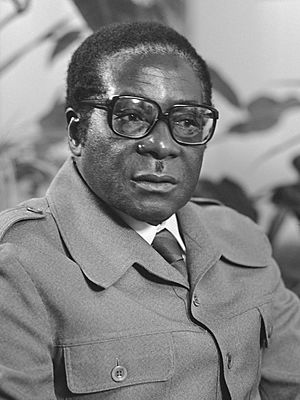
Mugabe in 1979
|
|
| 2nd President of Zimbabwe | |
| In office 31 December 1987 – 21 November 2017 |
|
| Prime Minister | Morgan Tsvangirai (2009–2013) |
| First Vice-president |
|
| Second Vice-president |
|
| Preceded by | Canaan Banana |
| Succeeded by | Emmerson Mnangagwa |
| 1st Prime Minister of Zimbabwe | |
| In office 18 April 1980 – 31 December 1987 |
|
| President | Canaan Banana |
| Deputy | Simon Muzenda |
| Preceded by | Abel Muzorewa (Zimbabwe Rhodesia) |
| Succeeded by | Morgan Tsvangirai (2009) |
| Leader and First Secretary of ZANU–PF ZANU (1975–1987) |
|
| In office 18 March 1975 – 19 November 2017 |
|
| Chairman |
|
| Second Secretary |
|
| Preceded by | Herbert Chitepo |
| Succeeded by | Emmerson Mnangagwa |
| 13th Chairperson of the African Union | |
| In office 30 January 2015 – 30 January 2016 |
|
| Leader | Nkosazana Dlamini-Zuma |
| Preceded by | Mohamed Ould Abdel Aziz |
| Succeeded by | Idriss Déby |
| 10th Secretary-General of the Non-Aligned Movement | |
| In office 6 September 1986 – 7 September 1989 |
|
| Preceded by | Zail Singh |
| Succeeded by | Janez Drnovšek |
| Personal details | |
| Born |
Robert Gabriel Mugabe
21 February 1924 Kutama, Southern Rhodesia (now Zimbabwe) |
| Died | 6 September 2019 (aged 95) Singapore |
| Resting place | Kutama, Zimbabwe |
| Political party | |
| Spouses | |
| Children | 4, including Bona and Robert Jr |
| Alma mater |
|
| Signature |  |
Robert Gabriel Mugabe ( 21 February 1924 – 6 September 2019) was a Zimbabwean revolutionary and politician who served as Prime Minister of Zimbabwe from 1980 to 1987 and then as President from 1987 to 2017.
Having dominated Zimbabwe's politics for nearly four decades, Mugabe was a controversial figure. He was praised as a revolutionary hero of the African liberation struggle who helped free Zimbabwe from British colonialism, imperialism, and white minority rule. Critics accused Mugabe of being a dictator responsible for economic mismanagement and widespread corruption and human rights abuses, including anti-white racism and crimes against humanity.
Contents
Early life
Robert Gabriel Mugabe was born on 21 February 1924 at the Kutama Mission village in Southern Rhodesia's Zvimba District. His father, Gabriel Matibiri, was a carpenter while his mother Bona was a Christian catechist for the village children. ona and Gabriel had six children: Miteri (Michael), Raphael, Robert, Dhonandhe (Donald), Sabina, and Bridgette.
Mugabe excelled at school, where he was a secretive and solitary child, preferring to read, rather than playing sports or socialising with other children. He was taunted by many of the other children, who regarded him as a coward and a mother's boy.
After completing six years of elementary education, in 1941 Mugabe was offered a place on a teacher training course at Kutama College. Mugabe's mother could not afford the tuition fees, which were paid in part by his grandfather. As part of this education, Mugabe began teaching at his old school, earning £2 per month, which he used to support his family. Having attained a teaching diploma, Mugabe left Kutama in 1945.
University education and teaching career: 1945–1960
In 1949 Mugabe won a scholarship to study at the University of Fort Hare in South Africa's Eastern Cape. In 1952, he graduated with a Bachelor of Arts degree in history and English literature. In later years he described his time at Fort Hare as the "turning point" in his life.
In 1958, Mugabe moved to Ghana to work at St Mary's Teacher Training College in Takoradi. There he met his first wife, Sally Hayfron. According to Mugabe, "I went [to Ghana] as an adventurist. I wanted to see what it would be like in an independent African state". Ghana had been the first African state to gain independence from European colonial powers and under the leadership of Kwame Nkrumah underwent a range of African nationalist reforms; Mugabe revelled in this environment. Mugabe later claimed that it was in Ghana that he finally embraced Marxism and joined African nationalists calling for an independent state controlled by the black majority.
Revolutionary activity and imprisonment
In August 1963, Hayfron gave birth to Mugabe's son, whom they named Nhamodzenyika, a Shona term meaning "suffering country". Mugabe decided to return to Southern Rhodesia.
Racial violence was growing in the country, with aggrieved black Africans targeting the white community. Mugabe deemed such conflict a necessary tactic in the overthrow of British colonial dominance and white minority rule. After making anti-government comments, Mugabe was convicted of sedition and sentenced to 21 months' imprisonment.
While Mugabe was imprisoned, in August 1964, the Rhodesian Front government—now under the leadership of Ian Smith— arrested all remaining leaders of the country's African nationalist movement. Smith's government made a unilateral declaration of independence from the United Kingdom in November 1965, renaming Southern Rhodesia as Rhodesia; the UK refused to recognise the legitimacy of this and imposed economic sanctions on the country.
In 1972, the African nationalists launched a guerrilla war against Smith's government.
Political career
On release, Mugabe fled to Mozambique, established his leadership of ZANU, and oversaw its role in the Rhodesian Bush War, fighting Ian Smith's predominately white government. He reluctantly participated in peace talks in the United Kingdom that resulted in the Lancaster House Agreement, putting an end to the war.
In the 1980 general election, Mugabe led ZANU-PF to victory, becoming Prime Minister when the country, now renamed Zimbabwe, gained internationally recognised independence later that year.
Prime Minister of Zimbabwe: 1980–1987
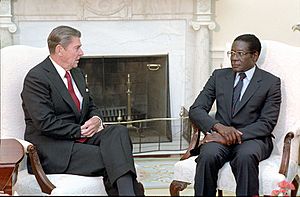
Once in office, Mugabe employed North Korean architects to design Heroes' Acre, a monument and complex in western Harare to commemorate the struggle against minority rule. Zimbabwe also received much aid from Western countries, whose governments hoped that a stable and prosperous Zimbabwe would aid the transition of South Africa away from apartheid and minority rule.
During Mugabe's tenure, the country's economy grew by an average of 2.7% a year, but this was outstripped by population growth and real income declined. The unemployment rate rose, reaching 26% in 1990. The government ran a budget deficit year-on-year that averaged at 10% of the country's gross domestic product. Under Mugabe's leadership, there was a massive expansion in education and health spending. In 1980, Zimbabwe had just 177 secondary schools, by 2000 this number had risen to 1,548. During that period, the adult literacy rate rose from 62% to 82%, one of the highest levels in Africa. Levels of child immunisation were raised from 25% of the population to 92%.
At independence, 39% of Zimbabwe's land was under the ownership of around 6000 white large-scale commercial farmers, while 4% was owned by black small-scale commercial farmers, and 41% was 'communal land' where 4 million people lived, often in overcrowded conditions. The Lancaster House agreement ensured that until 1990, the sale of land could only take place on a "willing seller-willing buyer" basis. The only permitted exceptions were if the land was "underutilised" or needed for a public purpose, in which case the government could compulsorily purchase it while fully compensating the owner. This meant that Mugabe's government was largely restricted to purchasing land which was of poor quality. Its target was to resettle 18,000 black families on 2.5 million acres of white-owned land over three years. This would cost £30 million (US$60 million), half of which was to be provided by the UK government as per the Lancaster House Agreement.
Mugabe initially emphasised racial reconciliation and he was keen to build a good relationship with white Zimbabweans. He hoped to avoid a white exodus and tried to allay fears that he would nationalise white-owned property.
Nevertheless, many white Zimbabweans complained that they were the victims of racial discrimination.
President of Zimbabwe
In late 1987, Zimbabwe's parliament amended the constitution. On 30 December it declared Mugabe to be executive president, a new position that combined the roles of head of state, head of government, and commander-in-chief of the armed forces. This position gave him the power to dissolve parliament, declare martial law, and run for an unlimited number of terms.
Over the course of the 1990s, Zimbabwe's economy steadily deteriorated. By 2000, living standards had declined from 1980; life expectancy was reduced, average wages were lower, and unemployment had trebled. By 1998, unemployment was almost at 50%. As of 2009, three to four million Zimbabweans—the greater part of the nation's skilled workforce—had left the country. In 1997 there were growing demands for pensions from those who had fought for the guerrilla armies in the revolutionary war, and in August 1997 Mugabe put together a pension package that would cost the county Z$4.2 billion. To finance this pension scheme, Mugabe's government proposed new taxes, but a general strike was called in protest in December 1997; amid protest from ZANU–PF itself, Mugabe's government abandoned the taxes. In January 1998, riots about lack of access to food broke out in Harare; the army was deployed to restore order, with at least ten killed and hundreds injured.
Mugabe increasingly blamed the country's economic problems on Western nations and the white Zimbabwean minority, who still controlled most of its commercial agriculture, mines, and manufacturing industry. He called on supporters "to strike fear in the hearts of the white man, our real enemy".
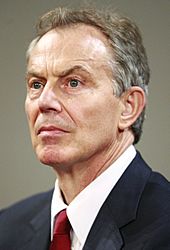
In 1997, Tony Blair was elected Prime Minister of the UK after 18 years of Conservative rule. His Labour government expressed reticence toward restarting the land resettlement payments promised by the Lancaster House Agreement. In October 1999, Mugabe visited Britain and in London, the human rights activist Peter Tatchell attempted to place him under citizen's arrest. It further damaged Anglo-Zimbabwean relations, with Mugabe expressing scorn for what he called "Blair and company". In May 2000, the UK froze all development aid to Zimbabwe. In December 1999, the IMF terminated financial support for Zimbabwe, citing economic mismanagement and widespread corruption as impediments to reform.
In February 2000, land invasions began as armed gangs attacked and occupied white-owned farms. The government referred to the attackers as "war veterans" but the majority were unemployed youth too young to have fought in the Rhodesian War. Mugabe justified the seizures by the fact that this land had been seized by white settlers from the indigenous African population in the 1890s. He portrayed the invasions as a struggle against colonialism and alleged that the UK was trying to overthrow his government. In May 2000, he issued a decree under the Presidential Powers (Temporary Measures) Act which empowered the government to seize farms without providing compensation, insisting that it was the British government that should make these payments.
In November 2001, Mugabe issued a presidential decree permitting the expropriation of virtually all white-owned farms in Zimbabwe without compensation. Mugabe's actions brought strong criticism.
In December 2014, Mugabe fired his vice-president, Joice Mujuru, accusing her of plotting his overthrow. In January 2015, Mugabe was elected as the Chairperson of the African Union (AU). In November 2015, he announced his intention to run for re-election as Zimbabwe's president in 2018, at the age of 94, and was accepted as the ZANU–PF candidate. In February 2016, Mugabe said he had no plans for retirement and would remain in power "until God says 'come'".
Coup d'état and resignation: 2017
On 15 November 2017, the Zimbabwe National Army placed Mugabe under house arrest at his Blue Roof mansion as part of what it described as an action against "criminals" in Mugabe's circle.
On 19 November, he was sacked as leader of ZANU–PF, and Mnangagwa was appointed in his place. The party also gave Mugabe an ultimatum: resign by noon the following day, or it would introduce an impeachment resolution against him. Before resigning, Mugabe and his wife had negotiated a deal, under which he and his kin were exempted from prosecution, his business interests would remain untouched, and he would receive a payment of at least $10 million.
Post-presidency
Late in December 2017, according to a government gazette, Mugabe was given full diplomatic status and, out of public funds, a five-bedroom house, up to 23 staff members, and personal vehicles. He further was permitted to keep the business interests and other wealth which he had amassed while in power, and he received an additional payment of about ten million dollars.
On 15 March 2018, in his first interview since removal from the presidency, Mugabe insisted that he had been ousted in a "coup d'état" which must be undone. He stated that he would not work with Mnangagwa and termed Mnangagwa's presidency "illegal" and "unconstitutional".
Illness, death and funeral: 2019
Mugabe was unable to walk, according to Emmerson Mnangagwa in November 2018, and had been receiving treatment in Singapore for the previous two months. He was hospitalised there in April 2019, making the last of several trips to the country for medical treatment, as he had done late in his presidency and following his resignation. He died at Gleneagles Hospital on 6 September 2019 at about 10:40 am, aged 95 (Singapore Standard Time). He was given a state funeral.
Mugabe was buried in his home town of Kutama. The burial took place on 28 September in a courtyard of his family home.
Images for kids
-
Morgan Tsvangirai led the MDC to growing success in opposing Mugabe's regime in the 2000 parliamentary election.
-
Mugabe was inspired by the example set by Ghana's Kwame Nkrumah.
-
While Mugabe was imprisoned, Ian Smith became leader of Rhodesia.
-
Mugabe in a meeting with Romanian communist leader Nicolae Ceaușescu in 1976
-
Mugabe meeting Japanese prime minister Shinzo Abe in 2016
-
Mugabe meeting Russian president Vladimir Putin in 2015
-
Mugabe's first wife, Sally Hayfron, in 1983
See also
 In Spanish: Robert Mugabe para niños
In Spanish: Robert Mugabe para niños


